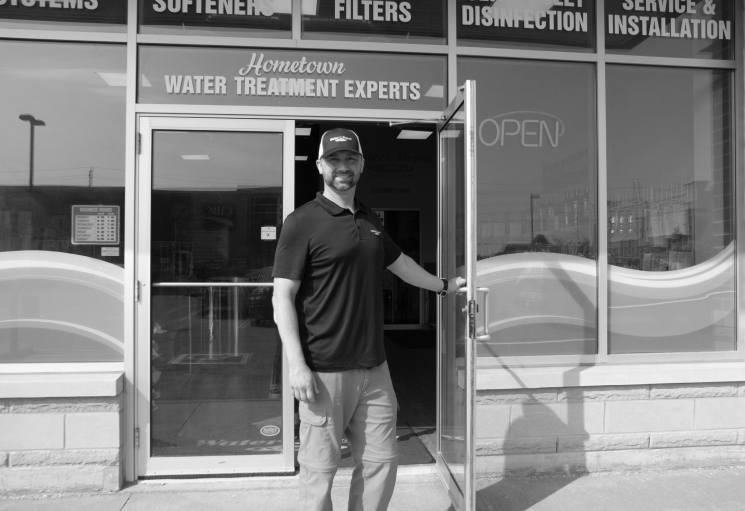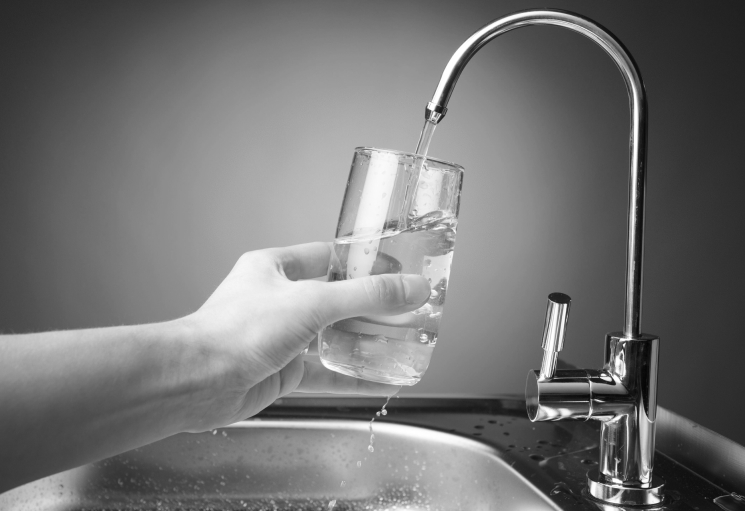
In most cases, your cottage water will be supplied from either a surface source, such as a lake or river, or a ground source, such as a drilled well. Whichever source your water comes from, a water treatment system can have many benefits for you and your family. When deciding on the equipment required in your cottage water treatment system, you must consider the quality of water that is coming from your water source.
Lakes and Rivers
When your water comes from a lake or river some of the most common water complaints are brown or yellow water, smelly water, staining on fixtures, or concerns about bacteria, to name a few. All of which can be caused by iron, tannins, sediment, sand, silt, or other organic materials found in lakes and rivers. A simple test will determine the cause of your water issue and the equipment required in your water treatment system.
Drilled Well
Water in a drilled well comes from the ground and has absorbed the many minerals that it comes in contact with. These minerals usually include iron, limestone, calcium, or magnesium, which cause hard water that can leave scale build-up on your bathroom and kitchen fixtures. In addition, hard water dries out your skin, nails, and hair, and can also be very damaging to your appliances and plumbing. A water test will determine the hardness level of your well water.
Solutions
Whatever your water source, you want the best water possible for your family and friends to use for drinking, cooking, and bathing. After determining the unique make-up of your water, a Water Depot Water Treatment Expert can recommend the right equipment to get you the best water possible.
Tannins and Sediment Filtration
If the water fed from a lake or river has a yellowish/brown tint it is most likely caused by tannins, sediment, sand, and silt found in your lake or river water. These organic materials affect the colour, taste, and clarity of your water, resulting in water that you may not be comfortable with. Tannins and sediment must be removed prior to water entering other water treatment equipment as they can cause harm and reduce the effectiveness of your system. If tannins build up on an Ultraviolet sleeve, they can render the lamp useless against disinfection.
Water Depot pre-filters trap sediment, sand, and silt, reducing odour, bad taste, cloudiness and more, allowing your water treatment system to work at its most effective.
Ultraviolet Disinfection
Lake and well water might be great for cottage activities, but microorganisms and pathogens, such as e.coli and coliform, can make it unsafe for drinking. A Water Depot Ultraviolet system inactivates these microorganisms, without adding any chemicals, drastically improving the quality of your water.
An Ultraviolet system offers effective disinfection against water-borne pathogens. As water passes through the system a high-intensity UV light inactivates these microorganisms creating clean, clear drinking water.
Ultraviolet systems are available in a variety of flow rates, measured in gallons per minute (GPM). A Water Depot water treatment expert will be able to recommend the appropriate flow rate to ensure that your family will always have a good supply of disinfected water, right at your tap.
Iron Filters
Iron-laden water leaves rust stains on sinks, toilets, tubs, and other fixtures. If your water has high levels of red iron, the water coming out of your tap may be yellow, orange or brown and your water may taste metallic. With clear iron, you may not notice at first, but over time you will begin to see pinkish staining on your fixtures.
In addition to the unpleasant look and taste iron has on your water, both clear and red iron can build up inside your pipes and fixtures, causing flow and pressure loss. Also, certain bacteria feed off the iron and create a smelly slime inside toilet tanks and water heaters.
Water Depot Iron Filters not only work to reduce both red and clear iron from your water, but also help to reduce Hydrogen Sulphide that is often found in water. Hydrogen Sulphide creates that rotten-egg smell that you might notice when you turn on your tap. While generally not harmful, the smell is unpleasant for drinking and bathing and can leave laundry with a foul odour.
Water Softeners
As discussed earlier, well water can often contain minerals that cause hard water. A Water Depot water softener uses an ion exchange process that will reduce hardness minerals so your appliances will last longer, work better, and are more cost-efficient to operate. Softened water is also better for your hair, skin, nails, and will help your clothes last longer.
pH Neutralizers
When it comes to well water, it is important to know what your pH level is. If your well’s pH level is too low or too high, it can have an adverse affect on your water. Water that is too acidic has a metallic or sour taste and can stain laundry, sinks, and drains with a bluish-green colour. It can also leach metals including iron, manganese, copper, lead, and zinc into your pipes causing corrosion.
The pH level of water is measured on a scale of 0-14, with 0 being the most acidic, 7 being neutral, and 14 being the most alkaline (or basic). The ideal measurement for drinking water should be between 6.5-8.5. A Water Depot pH Neutralizer works to elevate your well water’s pH to within safe levels before it enters your home.
Reverse Osmosis Systems
Now that your cottage water has been filtered, softened, and disinfected, you may want to go one step further by adding a reverse osmosis system. A Water Depot reverse osmosis system uses a series of filters and a reverse osmosis membrane to purify your water. An RO system delivers high-quality, filtered drinking water that is conveniently stored in a sealed tank for whenever your family needs it.
Water Depot RO systems are available in a range of filtration levels and storage tank sizes, so your family will never run out of purified drinking water.
Water Depot
Water chemistry differs in every river, lake, and well. A complimentary Water Depot water test will discover your cottage’s unique water chemistry and your family’s water demands. Your raw water will be tested for hardness minerals, red and clear iron, pH level, total dissolved solids (TDS), clarity, odour, and colour. This data, together with the information about your family’s water demands will determine the correct water treatment equipment and the sizing of the equipment required to bring clean, clear water to your cottage for years to come.
Did you find the information in this article useful? Water Depot are your local water treatment experts, carrying a large selection of water treatment products. Click here to get your free water test.






